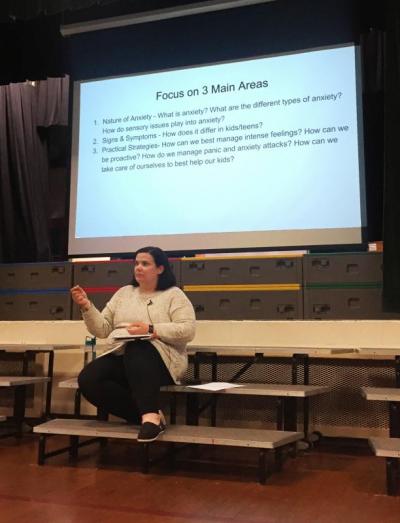Workshop helps parents worried about anxiety
Many parents don’t know how to deal with kids who have anxiety disorders, which can often manifest in severe behavioral or physical issues.
That’s why social worker and therapist Sara Rodrigues spoke to fifty or so parents who gathered at the Potter School on Thursday night for a workshop on anxiety.
Anxiety — which is the most common mental disorder in the country, and is on the rise — is not just regular nerves, but a chronic or disproportionate elevation of the body’s natural response to stressors.
It can result in a slew of mental and physical symptoms such as high blood pressure, insomnia, memory loss, nausea, digestive issues, a weakened immune system, irritability, and trouble concentrating.
Rodrigues spoke for an hour on the various types of anxiety, describing what goes on in an anxious person’s brain and suggesting practical strategies to help keep kids calm.
She told stories, asked questions, and even drew a few laughs as she gave an overview that was both personal — Rodrigues is a parent to anxious kids herself — and professional.
“Who’s totally looking forward to getting their kids to bed?” she asked at one point. Crickets, then general laughter followed. “It’s a process,” she admitted.
These included both proactive plans, such as sticking to routines and structuring transitions as much as possible, as well as ways to calm a panicking child.
“Never in the history of ever has it been helpful to tell someone to calm down,” she said.
And reassuring an overly anxious person won’t help either, as they often just won’t believe it.
Instead, she suggested practicing breathing strategies, or asking them to take five — list five things they see, four things they hear, three things they can touch, etc. so that they focus on something else.
Parents can also ask “and then what?” over and over again to help guide children through what’s making them anxious.
According to Rodrigues, anxious people need to discover for themselves that whatever is causing their stress may not be so bad — and talking them through it can help.
The questions at the end of the talk went on for well over an hour, as parent after parent — many of elementary school-aged children — described their situation.
“As a parent, it kind of gets scary,” said one father with an anxious seven-year-old boy. “He starts rocking back and forth, he kind of starts hitting himself...I don’t know what to do.”
Another parent was worried about her seven-year-old daughter, who gets so anxious she runs out of the house and hides. “It’s unsafe,” her mother said.
Many parents felt a sense of relief that they weren’t alone.
“When you deal with just one child, you don’t hear other people’s perspectives,” said one man about his anxious seven-year-old grandson.
“So having an opportunity to listen to other parents and professionals talk about particular children and the symptoms they’re showing is useful,” he added. “It’s not easy to figure out what’s going on.”
“I learned a lot of things I wasn’t aware of, and I think she gave a lot of good suggestions on coping,” said one mother.
“I like how she said anxiety isn’t just being nervous. There’s so much more to it that you don’t realize.”













